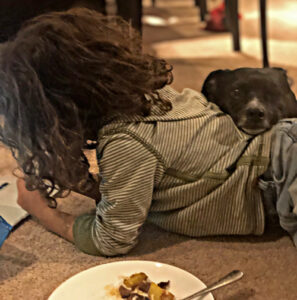With Thanksgiving coming up, family all around, and food you only get to eat once a year, it can be tempting to share a special treat with your animals as well as your family. However, there are a great many foods that pets can’t have, especially Thanksgiving themed foods. Here’s a list of things to avoid giving them, so that you or any family members can keep your pet happy and healthy this Thanksgiving season.
Turkey – while lean, plain turkey can often be the protein of choice in many pet foods, make no mistake – the turkey we prepare on Thanksgiving is not a substitute. Basted, brined, buttered, oiled, stuffed, or however you may be preparing it this year introduces many dangerous elements to the turkey meat that dogs and cats can have a very hard time digesting. In some cases of older pets, feeding them high sodium, high fat Thanksgiving turkey can even be a fast track to pancreatitis.
Bones – so if you can’t feed your pets your Turkey, perhaps carving it or the process of making any other Thanksgiving style roast has left you with some nice juicy bones to give your pets as treats. However, it’s likely that roasted bones will splinter as your pet tries to get to the marrow, which can be extremely sharp and dangerous. Another possibility is that if they manage to swallow the bone whole, it can get lodged in their intestines.
Alcohol – the holidays for many can be a time to unwind, enjoy time off work, and have a glass of wine. Sometimes a fingerful of champagne can seem like a nice treat for your pets when everyone is celebrating! Unfortunately, alcohol can lead to ethanol poisoning in pets, which affects them the same as it does humans, but becomes dangerous in much smaller quantities. Even rum cakes or other slightly alcoholic dishes are a bad idea to share with your pet.

Sweets – Most pet owners know that chocolate is dangerous for their fuzzy friends, but there is a whole gamut of sweet treats that pets should be kept from. It helps to remember that the darker the chocolate, the more dangerous, as milk and white chocolate (while still off limits!) contain increasingly greater quantities of milk, diluting the dangerous compound theobromine that makes them sick. Xylitol, a sweetener used in many store bought desserts, can also cause liver failure or a dangerous drop in blood sugar.
Caffeine – caffeine affects pets in the very same way theobromine in chocolate does – this makes it equally as off-limits to your pets as chocolate! It can also cause restlessness, vomiting, spikes in blood pressure, and even seizures.
Onions – most members of the onion family, including green onions / shallots / chives, may be a staple in Thanksgiving flavors, but they all contain thiosulphate, a dangerous compound for animals. It’s important to note that thiosulphate exists within onions even after cooking, and that cooked onions can be just as dangerous as raw.
Grapes – the nature of toxicity of grapes or raisins to dogs is somewhat of a mystery, as the kidney failure that they cause is not yet linked to a certain compound. Even more unsettling, whichever compound causes the kidneys to fail is both acute and sudden in it’s toxicology. A dog could eat a grape, for example, and be perfectly fine, but every time they get ahold of a grape it’s a huge risk to take, and the ASPCA recommends seeking treatment even if they only eat one or a few.
If you’re truly aching to share your Thanksgiving meal with your pet, there are ways to give them plain, lean turkey and unsweetened canned pumpkin properly, but please do your research to make sure that what you’re feeding them doesn’t contain anything harmful.

That covers most of the foods unanimously present during Thanksgiving, but it helps to keep in mind that dogs and cats should also not be fed dairy products, avocado, citrus, eggs and anything overly salty. Keep to their regular diet over the holidays and show them love just the same to include them in your festivities!
If you’re looking to up the quality of your pets food, there are home cooked diets that work well for pets. Stay tuned for a larger post soon on what to know about pet food, what to look for when buying, and options for making your own! While we’re working on that, feel free to look here for frequently asked questions about crafting a homemade diet for your pet.
We used a variety of sources to amalgamate the info on this blog post, and if you’d like to browse them, check here, here, and here.
Happy Holidays!
